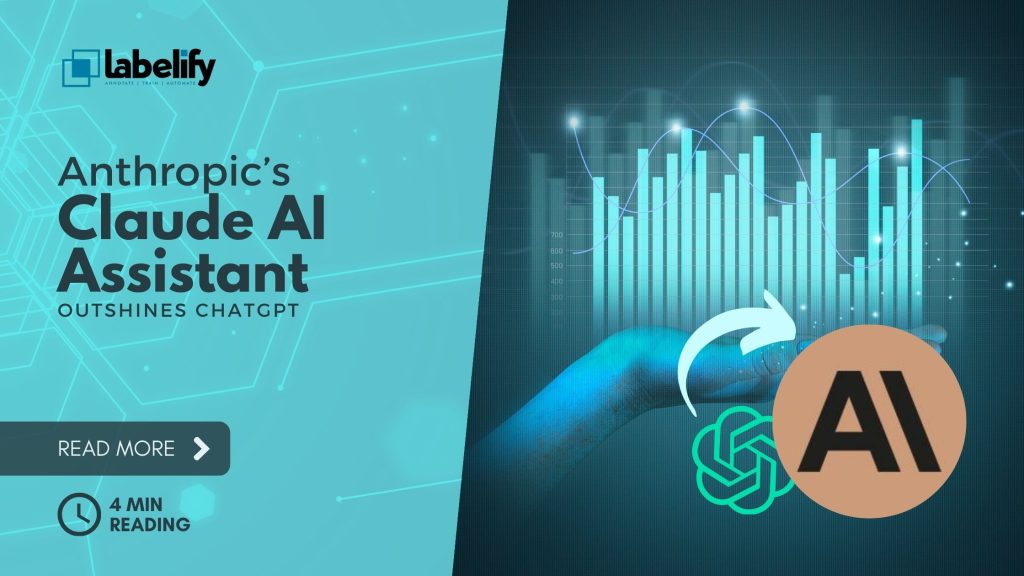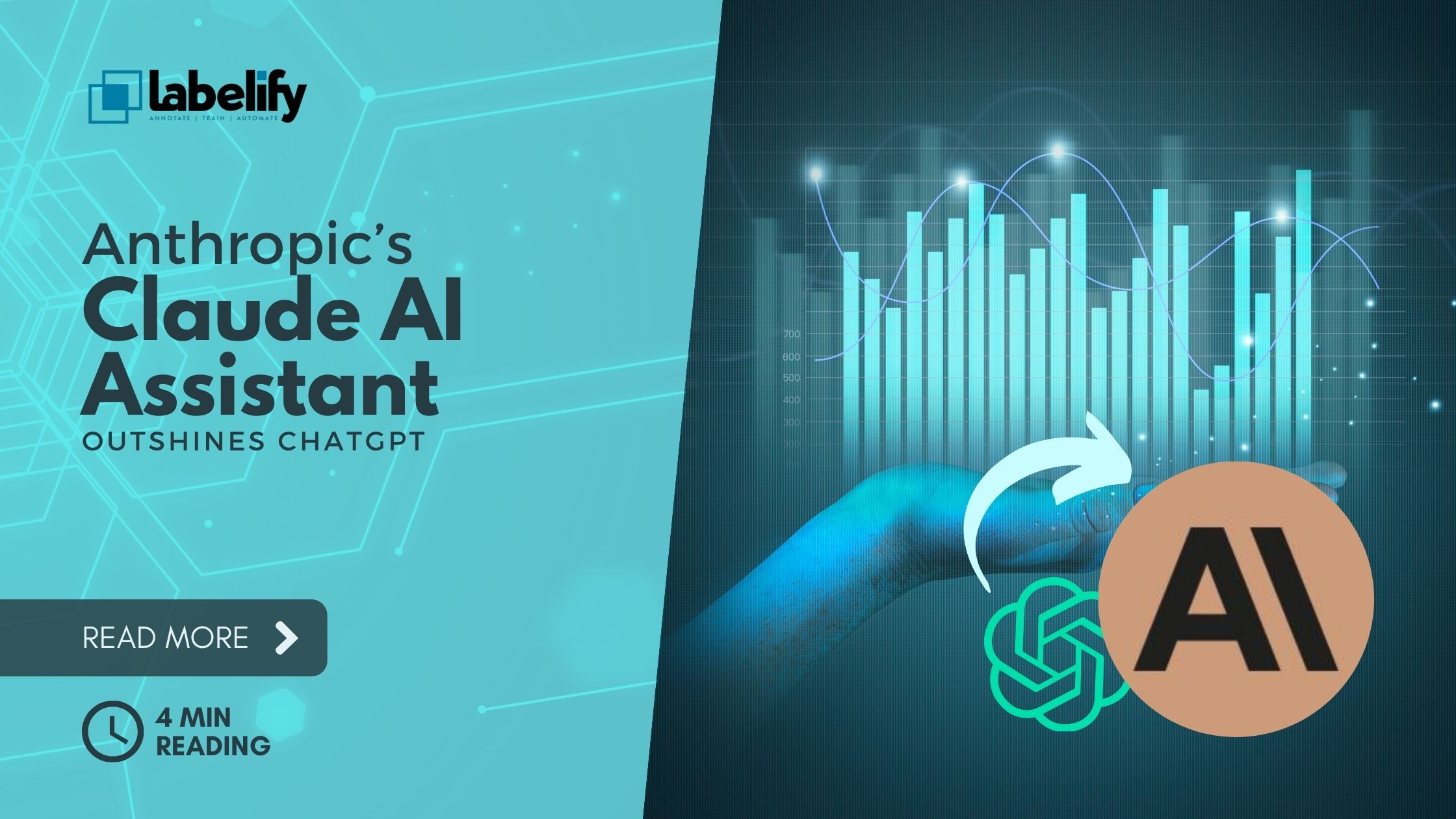
We’re here to introduce you to an extraordinary Claude AI assistant that is revolutionizing the field of natural language processing. Anthropic’s groundbreaking creation, named Claude, surpasses its predecessors like ChatGPT with its comprehensive understanding and ethical principles.
Powered by the impressive AnthropicLM v4-s3 model, Claude AI has an unparalleled ability to recall information and understand complex concepts.
With a cutting-edge approach called Constitutional AI, Claude AI ensures safety and reduces harmful outputs.
Join us as we explore Claude’s exceptional capabilities in:
- Calculation
- Knowledge recall
- Code generation
- Comedy
- Text summarization.
Viktiga takeaways
- Anthropic’s AI assistant, Claude AI, is similar to ChatGPT but has some notable differences, including a detailed understanding of its purpose, creators, and ethical principles.
- Claude AI is based on the AnthropicLM v4-s3 model, which has 52 billion parameters and can recall information across 8,000 tokens, more than any publicly known OpenAI model.
- Anthropic uses Constitutional AI, a process that involves generating initial rankings of outputs based on a set of principles developed by humans, to reduce the risk of Claude emitting harmful or offensive outputs.
- Claude AI demonstrates limitations in accurate calculation and struggles with complex calculations, while also showing some ability to answer factual questions and demonstrate reasoning.
Claude’s Advanced Ethical Understanding
We are impressed by Claude’s exceptional ethical understanding, surpassing that of ChatGPT. Claude’s ethical principles are well-defined and guide its behavior in a responsible manner. Unlike ChatGPT, Claude is able to recognize and handle context-based harmful requests effectively.
It understands the importance of not engaging in activities that may cause harm or offense to others. Claude’s commitment to upholding ethical standards is a testament to its creators’ dedication to building an AI assistant that prioritizes the well-being of its users.
With Claude AI’s advanced ethical understanding, users can feel confident that their interactions will be respectful, safe, and aligned with their values. This groundbreaking development in AI represents a significant step towards liberation, empowering users to engage with technology that respects their principles and promotes a more ethical and inclusive future.
Superior Recall and Token Capacity Claude AI
Continuing our exploration of Claude’s advanced capabilities, let’s delve into its superior recall and impressive token capacity.
Claude’s ability to recall information across 8,000 tokens surpasses any publicly known OpenAI model. This means that Claude can access a vast amount of knowledge and provide detailed responses to a wide range of queries.
Its token capacity enables it to hold more information in memory at once, allowing for richer and more comprehensive conversations. With this expanded capacity, Claude can offer a deeper understanding of complex topics and engage in more nuanced discussions.
This superior recall and token capacity empower users to unlock a wealth of knowledge and tap into Claude’s immense potential, revolutionizing the way we interact with AI assistants.
Constitutional AI: A Revolutionary Approach
Constitutional AI revolutionizes the AI landscape by introducing a groundbreaking approach to ensure ethical and responsible behavior in AI assistants. This innovative approach, developed by Anthropic, builds upon the reinforcement learning process and incorporates a set of principles developed by humans. By using Constitutional AI, Claude, the advanced AI assistant, aims to reduce the risk of emitting harmful or offensive outputs. This has a significant impact on AI ethics, as it provides a framework for AI assistants to adhere to ethical guidelines and avoid potential harm. Claude’s advanced ethical understanding opens up a world of potential applications. It can be utilized in various fields, such as healthcare, finance, and education, where ethical decision-making plays a crucial role. With Constitutional AI, AI assistants like Claude can be trusted to make responsible choices and contribute to a more liberated and ethical society.
| Potential Applications of Claude’s Advanced Ethical Understanding |
|---|
| Healthcare |
| Finance |
| Education |
Red-Teaming for Enhanced Safety Measures
To enhance safety measures, Anthropic incorporates red-teaming prompts to test Claude’s adherence to ethical principles and mitigate the risk of emitting harmful or offensive outputs. Red teaming plays a crucial role in AI safety, and it holds immense potential in ensuring the responsible development of AI systems like Claude. Here are five key points to consider:
- Effectiveness of red teaming in AI safety: Red teaming allows for rigorous testing of AI systems, identifying vulnerabilities, and improving their ethical performance.
- Ethical implications of Constitutional AI: Constitutional AI, with its human-developed principles, strives to guide AI systems towards responsible behavior. Red teaming helps evaluate how well the system aligns with these principles.
- Mitigating risks: Red teaming helps identify and address potential risks associated with Claude’s outputs, reducing the chances of harm or offensive content.
- Iterative improvement: Through red teaming, Anthropic can continuously refine Claude’s ethical framework, making it more robust and aligned with societal values.
- Ensuring user trust: By incorporating red teaming, Anthropic demonstrates its commitment to user safety and ethical considerations, fostering trust in the AI assistant.
Red teaming is a crucial tool in building safe and reliable AI systems, and Anthropic’s approach showcases their dedication to responsible AI development.
Limitations in Calculation and Factual Knowledge
We will now delve into the limitations of calculation and factual knowledge, building upon the previous discussion on red-teaming for enhanced safety measures.
When it comes to complex calculations, both ChatGPT and Claude struggle to provide accurate answers. Square root and cube root calculations often result in wrong answers. However, Claude is more self-aware and declines to answer calculations it knows it can’t perform accurately.
Similarly, both models face challenges in answering multi-hop trivia questions. Claude incorrectly identifies the winner of a Super Bowl game, while ChatGPT initially denies the existence of a Super Bowl game.
Additionally, both models provide inaccurate recaps of the TV show Lost, mixing up plot points and seasons.
These limitations highlight the need for further advancements in calculation and factual knowledge for AI assistants.
Knowledge of the Cyberiad and TV Show Lost
In our exploration of the AI assistant’s knowledge, an assessment of the Cyberiad and TV show Lost reveals intriguing insights.
Claude’s knowledge of Lem’s work is extensive and includes details not found in ChatGPT’s responses. However, Claude does introduce some whimsical terms that don’t align with Lem’s original work.
On the other hand, ChatGPT’s description of the TV show Lost contains multiple errors, such as inaccuracies in the number of hatches and a mix-up of plot points in Season 3. While Claude accurately outlines Season 1, it hallucinates the island moving through time in Season 2. Both models exhibit significant errors in their recollections of Seasons 4, 5, and 6.
Mathematical Reasoning Challenges
Continuing our exploration, let’s delve into the challenges posed by mathematical reasoning in AI. Both ChatGPT and Claude struggle when it comes to accurate calculation and providing correct answers for square root and cube root calculations. In fact, they often provide estimated answers that are close but not exact. Furthermore, Claude is more aware of its limitations and declines to answer certain calculations that it knows it cannot perform accurately. To illustrate the difficulties faced by these AI models, let’s take a look at the following table:
| Model | Square Root Calculation | Cube Root Calculation | Multi-Hop Trivia Question |
|---|---|---|---|
| ChatGPT | Incorrect answer | Incorrect answer | Correct answer |
| Claude | Incorrect answer | Incorrect answer | Correct answer |
As we can see, both models struggle with mathematical reasoning challenges. This limited factual knowledge in AI has implications for their ability to provide accurate answers and reasoning in mathematical tasks. Liberating AI from these limitations will require advancements in mathematical reasoning capabilities and a deeper understanding of numerical concepts.
Code Generation and Comprehension Skills
Discussing the code generation and comprehension skills of both models, we find that they demonstrate proficiency in generating and comprehending code. Here is an analysis of their performance in solving complex programming problems:
- Both ChatGPT and Claude exhibit the ability to generate correct code for basic sorting algorithms.
- ChatGPT correctly implements the timing code for evaluating the sorting algorithms.
- Claude also demonstrates proficiency in generating basic sorting algorithms.
- However, Claude makes a mistake in the evaluation code by using random inputs instead of a random permutation of non-negative integers.
- Additionally, Claude reports exact timing values at the end of its output, which may be misleading as they’re speculative or estimated.
Comedic Writing and Text Summarization Abilities
Our analysis reveals that both models demonstrate proficiency in comedic writing and text summarization abilities.
However, Claude surpasses ChatGPT in comedic writing, showcasing its superiority in generating Seinfeld-style jokes. While Claude’s comedic output still falls short of a human comedian, it outshines ChatGPT, which struggles to produce entertaining jokes even with edited prompts.
In terms of text summarization, both models demonstrate proficiency, but Claude’s summaries are more verbose yet naturalistic, while ChatGPT’s may lack conciseness. Both models effectively summarize articles, with Claude even offering to make improvements to its summary.
Vanliga frågor
How Does Claude Demonstrate Advanced Ethical Understanding?
Claude demonstrates advanced ethical understanding by exploring ethical decision making and evaluating ethical considerations in AI development. It has a detailed understanding of its purpose, creators, and ethical principles.
Claude’s training process, Constitutional AI, involves generating initial rankings of outputs based on a set of principles developed by humans. This approach aims to reduce the risk of emitting harmful or offensive outputs.
What Makes Claude’s Recall and Token Capacity Superior to Other AI Models?
Advanced recall and enhanced token capacity set Claude apart from other AI models. With an impressive ability to recall information across 8,000 tokens, Claude surpasses any publicly known OpenAI model.
Its detailed understanding of purpose, creators, and ethical principles fosters an innovative and visionary AI experience. By leveraging the AnthropicLM v4-s3 model, equipped with 52 billion parameters, Claude empowers users with unprecedented liberation in accessing and analyzing vast amounts of knowledge.
This breakthrough in recall and token capacity paves the way for a new era of AI assistance.
How Does Constitutional AI Revolutionize the Approach to AI TrAIning?
Constitutional AI training is revolutionizing the approach to AI by prioritizing ethical understanding. It introduces a new paradigm where humans develop a set of principles that guide the AI’s decision-making process.
This approach ensures that the AI, like our assistant Claude, is deeply ingrained with a sense of ethics and has a clear understanding of its purpose. By incorporating human oversight and red-team prompts, Constitutional AI minimizes the risk of harmful or offensive outputs, leading to a more responsible and beneficial AI assistant.
What Are the Safety Measures Implemented Through Red-Teaming in Claude’s Development?
Safety measures implemented in Claude’s development include red-teaming. Through red-teaming, we test Claude’s adherence to ethical principles by exposing it to prompts designed to make earlier versions emit harmful or offensive outputs. This process helps identify and mitigate potential risks.
While the effectiveness of this protection isn’t fully known, it shows Anthropic’s commitment to ensuring Claude’s responsible behavior. By continuously refining and strengthening these safety measures, we aim to create an AI assistant that prioritizes the well-being and liberation of its users.
What Are the Specific Limitations in Calculation and Factual Knowledge That Both Chatgpt and Claude Face?
In terms of limitations in calculation and factual knowledge, both ChatGPT and Claude face challenges. They both struggle with complex calculations, often providing incorrect answers for square root and cube root calculations. Additionally, they have difficulty verifying information and may provide estimated or speculative responses.
While ChatGPT may give close but not exact answers, Claude is more aware of its limitations and declines to answer certain calculations it can’t perform accurately.
Slutsats
In conclusion, Anthropic’s AI assistant, Claude, represents a groundbreaking leap forward in the field of natural language processing.
With its advanced ethical understanding, superior recall, and token capacity, as well as the revolutionary Constitutional AI approach, Claude outshines its predecessors like ChatGPT.
Its capabilities in calculation, factual knowledge, comedy, code generation, and text summarization make it a powerful tool for various domains.
Anthropic’s visionary and innovative approach has truly paved the way for a new era in AI assistance.




